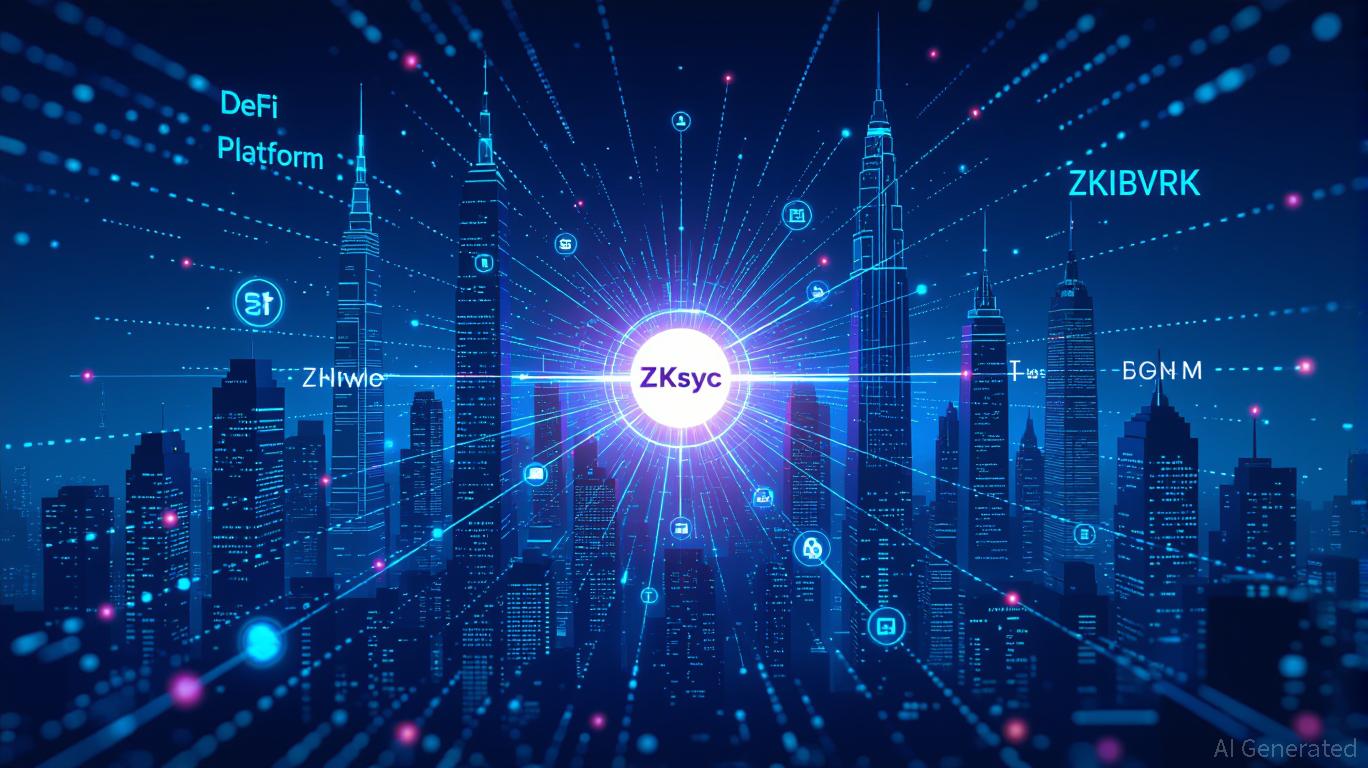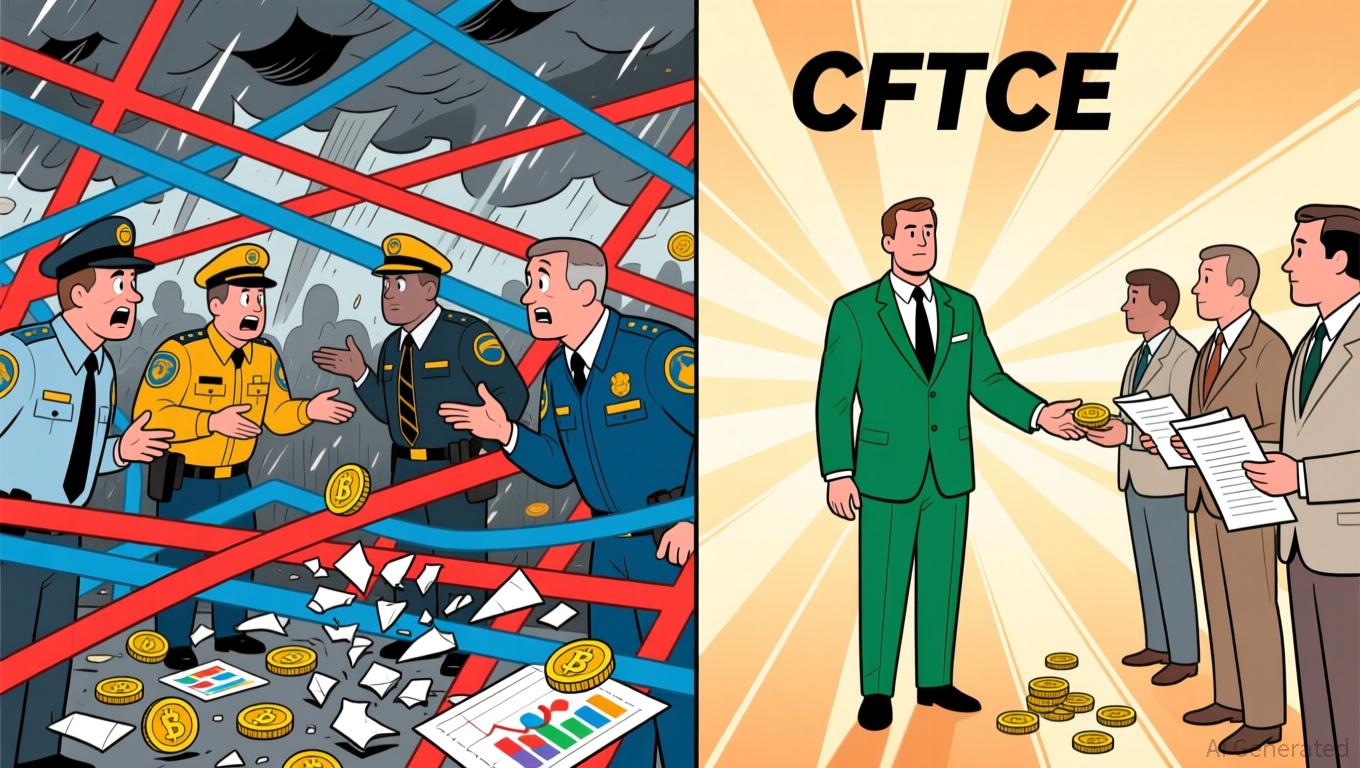ZK Atlas Enhancement: Transforming DeFi with Zero-Knowledge Powered Scalability
- ZKsync's October 2025 Atlas Upgrade introduces modular Layer 2/3 infrastructure, achieving 15,000 TPS and slashing proving costs via RISC-V-based Airbender prover. - The upgrade enables zero-fee DeFi transactions and real-time asset tokenization, with ZK token surging 50% and $19M in institutional funding for integration. - By unlocking RWA tokenization and addressing trust gaps through ZKP protocols, ZK infrastructure is redefining DeFi scalability while navigating regulatory and integration challenges.
The
ZK
Atlas Upgrade: Transforming DeFi Scalability
The ZKsync Atlas Upgrade, revealed on October 8, 2025, marks a major evolution in blockchain design. By deploying a modular Layer 2/3 framework, it supports more than 15,000 transactions per second (TPS)—a dramatic improvement over Ethereum’s 30 TPS ceiling, according to the
For DeFi, this translates to zero transaction fees and immediate settlements, addressing two major barriers to widespread use. Picture a decentralized exchange (DEX) where trades are completed in milliseconds without gas fee battles, or a lending service that updates collateral instantly. The
Institutional Embrace and Market Reaction: ZK Gets the Green Light
The industry has taken notice of this shift. The ZK token, native to the ZKsync network, jumped 50% after the upgrade, reflecting strong institutional interest, according to the
The ZK Atlas Upgrade also paves the way for tokenizing real-world assets (RWA) by enabling

Obstacles and Future Prospects
No major innovation comes without challenges. Regulatory uncertainty and the difficulty of integrating ZK with existing systems are still significant obstacles. Yet, ZKsync’s modular approach and support for Blockchain-as-a-Service (BaaS) solutions help reduce these risks, as explained in the
Additionally, the ZKP (Zero-Knowledge Proof) protocol’s verified knowledge economy—where users bid on and confirm factual information—complements ZK infrastructure by closing trust gaps in decentralized systems, as noted in the
Conclusion: Essential for the Next Wave of Finance
The ZK Atlas Upgrade is more than just a technical enhancement—it’s a roadmap for the future of DeFi. By resolving scalability issues without sacrificing security, ZK technology is quickly establishing itself as the foundation of Web3. For investors, this means preparing for a world where blockchain is not just experimental, but a core part of global finance.
With the rapid ascent of the ZK token and growing institutional alliances, the market is already anticipating a future dominated by ZK-driven platforms. Ignoring this development isn’t just missing a trend—it’s overlooking the next $100 billion opportunity.
Disclaimer: The content of this article solely reflects the author's opinion and does not represent the platform in any capacity. This article is not intended to serve as a reference for making investment decisions.
You may also like
Bipartisan Legislation Assigns Crypto Regulation to CFTC to Clarify Oversight Uncertainty
- U.S. lawmakers propose shifting crypto regulation from SEC to CFTC via a bipartisan bill, reclassifying most digital assets as commodities. - The draft aims to resolve regulatory ambiguity stifling innovation, building on stalled House CLARITY Act efforts during the 38-day government shutdown. - Market optimism surged as shutdown relief pushed Bitcoin above $105k, with ETF outflows persisting amid anticipation of clearer CFTC-led oversight. - Critics warn of CFTC resource constraints, while proponents hi

Solana News Update: DevvStream Invests in SOL Despite $11.8M Deficit, Shows Strong Confidence in Sustainable Blockchain Prospects
- DevvStream Corp. (DEVS) disclosed holding 12,185 SOL and 22.229 BTC, staking SOL for 6.29% annualized yield amid a $11.8M fiscal 2025 loss. - The company launched a digital asset treasury via BitGo/FRNT Financial, securing $10M liquidity from a $300M convertible note facility. - Plans include a 2026 tokenization platform for carbon credits and Solana staking, aligning with its de-SPAC/Nasdaq listing strategy. - Despite crypto market outflows, DevvStream's staked SOL attracted inflows, contrasting broader
ALGO Falls by 2.28% Over 24 Hours as Short- and Long-Term Performance Shows Mixed Results
- ALGO dropped 2.28% in 24 hours to $0.1844, contrasting with 17.29% weekly and 4% monthly gains but a 44.84% annual decline. - Traders monitor ALGO's resilience amid macroeconomic shifts, though long-term bearish trends highlight structural challenges. - Key support at $0.18 could trigger bullish momentum if held, while breakdown risks further declines toward $0.15. - A backtest analyzing 15% single-day spikes aims to assess ALGO's potential for sustained gains or pullbacks post-rallies.
BCH Gains 1.24% Following Banco de Chile’s Announcement of Bylaw Changes
- Banco de Chile (BCH) announced bylaw amendments on Nov 10, 2025, to strengthen corporate governance and align with regulatory standards. - The announcement coincided with a 10.81% 7-day stock surge, contrasting with a 2.07% monthly decline but supporting a 20.6% annual gain. - Investors viewed governance reforms positively, as such changes often signal improved transparency and accountability in regulated markets.